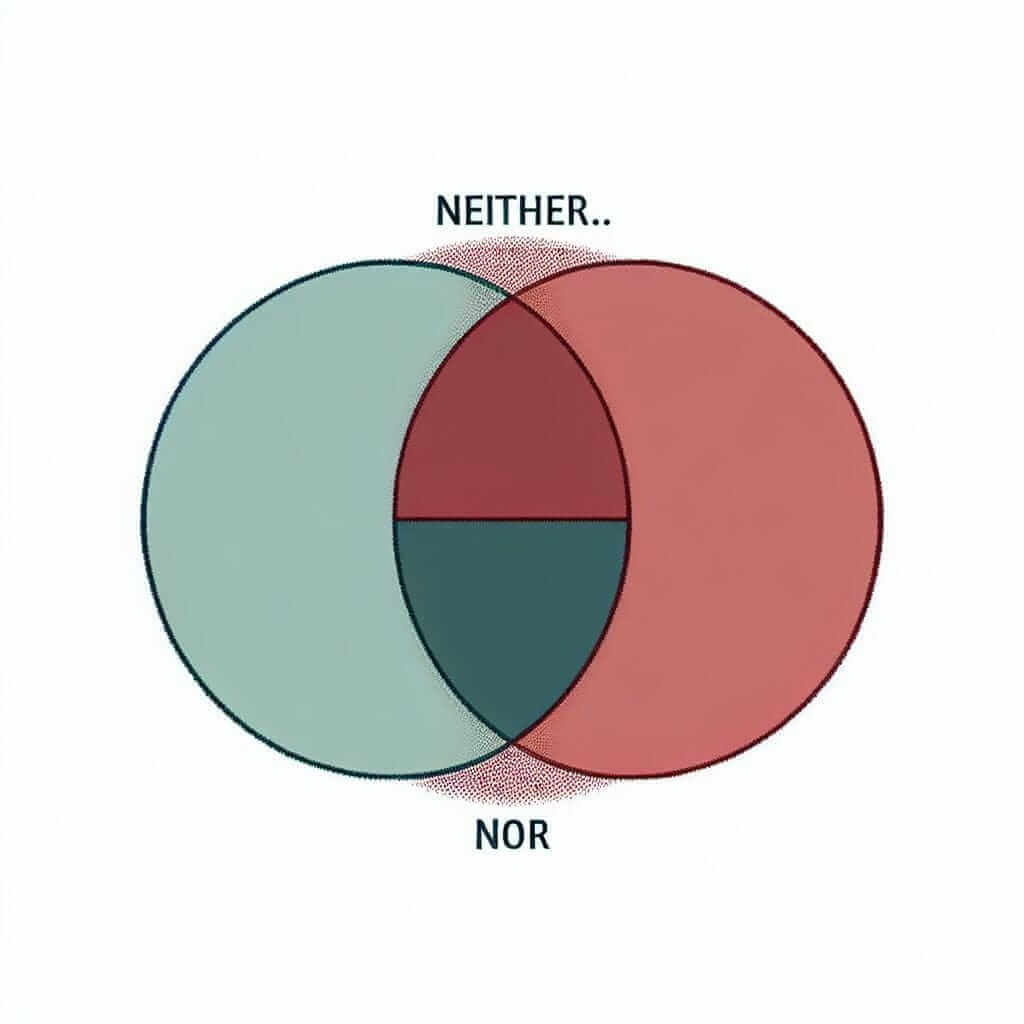“Neither… nor” is a powerful grammatical construction that can add sophistication and clarity to your English, particularly in your IELTS writing and speaking exams. While it may seem simple, mastering its use can significantly enhance your ability to express complex ideas accurately and concisely, thereby boosting your overall score.
Here are a few examples of how “neither… nor” can be used across different sections of the IELTS exam:
Speaking: “I’m not really into action movies or romantic comedies. Neither explosions nor cheesy love stories appeal to me.” (Expressing preferences)
Writing Task 1: “The graph shows that neither the cost of living nor the unemployment rate has significantly changed in the past year.” (Describing trends)
Writing Task 2: “Some people believe that the government should invest heavily in renewable energy sources, while others argue for continued reliance on fossil fuels. However, I believe that neither extreme is the solution, and a more balanced approach is required.” (Presenting an argument)
Understanding “Neither… Nor” in IELTS
The construction “neither… nor” is a correlative conjunction, meaning it connects two grammatically equal elements (words, phrases, or clauses) and shows that they are both being negated. It’s a more emphatic way of saying “not this one and not that one either.” Using it effectively demonstrates your command of English grammar and your ability to articulate complex ideas precisely.
This grammatical structure is particularly useful in the IELTS exam, where clarity, conciseness, and accuracy are crucial for achieving a high score. It allows you to:
- Present contrasting ideas clearly: “Neither the benefits nor the drawbacks of this proposal are immediately apparent.”
- Express opinions and preferences effectively: “I neither agree nor disagree with the statement.”
- Construct complex sentences with grammatical accuracy: “Neither the economic downturn nor the political instability has deterred investors from putting their money into the country.”
Mastering the Use of “Neither… Nor”
Here’s a breakdown of how to use “neither… nor” correctly in your IELTS exam:
The Formula:
Neither + [Element 1] + Nor + [Element 2] + [Verb (agreeing with the negative)]
Important Considerations:
-
Parallelism: Ensure both elements connected by “neither… nor” are grammatically parallel.
- Incorrect: “He neither enjoys swimming nor to play basketball.”
- Correct: “He neither enjoys swimming nor playing basketball.”
-
Subject-Verb Agreement: The verb should agree with the plural sense of the negation, even if both elements are singular.
- Incorrect: “Neither the book nor the movie was interesting.”
- Correct: “Neither the book nor the movie were interesting.”

Using “Neither… Nor” in Different IELTS Sections
1. Speaking
- Expressing Disagreement:
“I understand your point, but I neither support nor condone such actions.” - Describing Preferences:
“I’m not really into fantasy or science fiction. Neither dragons nor spaceships interest me.” - Comparing and Contrasting:
“Both cities are beautiful, but neither Paris nor Rome can compare to the charm of Venice.”
2. Writing Task 1 (Describing Data)
- Highlighting Trends:
“The graph illustrates that neither oil production nor consumption has decreased significantly despite the global push for renewable energy.” - Comparing Figures:
“In 2010, neither the UK nor Germany reached their renewable energy targets.”
3. Writing Task 2 (Essays)
- Presenting a Balanced Viewpoint:
“While some argue for stricter gun control laws, others advocate for personal freedom. However, I believe that neither extreme offers a viable solution.” - Refuting Arguments:
“Some critics claim that the new policy will harm the economy. However, neither the evidence nor the projections support this claim.” - Developing Complex Ideas:
“The success of a company depends on neither financial resources nor technological advancement alone, but rather on a combination of factors including effective leadership, a strong company culture, and a customer-centric approach.”
Achieving a Higher Score: Advanced Uses of “Neither… Nor”
To demonstrate a more sophisticated grasp of English grammar, consider these advanced uses:
- Using “neither… nor” with more than two elements:
“The government’s plan addresses neither the economic crisis, the healthcare system, nor the education reform.” - Placing “neither… nor” at the beginning of a sentence for emphasis:
“Neither the allure of fame nor the promise of fortune could tempt her to compromise her principles.” - Using “neither… nor” with auxiliary verbs:
“He neither can nor will attend the meeting tomorrow.”
Common Errors and How to Avoid Them
-
Incorrect Parallel Structure:
“The program was neither informative nor did it entertain.” (Incorrect)
“The program was neither informative nor entertaining.” (Correct) -
Incorrect Subject-Verb Agreement:
“Neither the students nor the teacher is ready for the exam.” (Incorrect)
“Neither the students nor the teacher are ready for the exam.” (Correct) -
Using double negatives:
“I don’t like neither coffee nor tea.” (Incorrect)
“I like neither coffee nor tea.” (Correct)
Conclusion
Mastering the use of “neither… nor” is a valuable asset for achieving a high score on your IELTS exam. It allows you to express complex ideas clearly and concisely, demonstrating your command of English grammar. Remember to pay close attention to subject-verb agreement and maintain parallel structure when using this conjunction. Consistent practice and a focus on accuracy will ensure that you can confidently use “neither… nor” to enhance your writing and speaking skills.